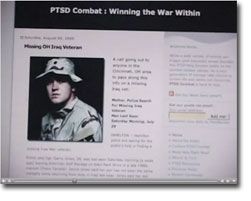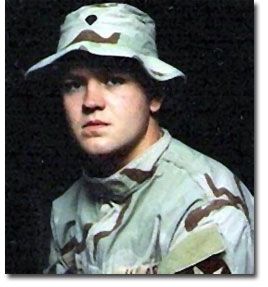 The personal is political.
The personal is political.
My oldest sister, the one with that gorgeous smile and heart of gold looking over my shoulder, committed suicide nearly 6 years ago. I miss her a lot. There are still times like today that I cry over the loss of this kind and sweet lady. But she's with me every single day. Literally.
Her lost battle has been the bridge to the empathy I have for others who lose family members to suicide. She's the reason I began writing about post-traumatic stress disorder [PTSD] in our returning troops after reading an August 31, 2005 Seattle Weekly article. She's the inspiration for the PTSD Timeline, and she's the inspiration for this online journal you're reading today, and the upcoming book, and everything else that's flowed from my reporting on PTSD.
Click on 'Article Link' below tags for more...
Yesterday, at midnight, the federal government wanted to take over the most successful non-profit, confidential suicide hotline available. They almost did it. The largest private non-government suicide hotline (the National Hopeline Network), working tirelessly the past 8 years to build up the 1-800-SUICIDE resource, will continue to operate for two precious weeks due to an enormous outpouring of support yesterday.
I'd like to think that many of those who responded to my call for help yesterday evening had a little something to do with it.
Please help 1-800-SUICIDE remain open and confidential.
Late yesterday afternoon, I came across this article from Taylor Marsh for Huffington Post:
If you've ever known anyone in the throws of deep depression, especially someone who is suicidal, you know that reaching out for help is not easy. Depression brings with it a lot of shame, especially when you're in the throws of the deepest, blackest heart of the illness. Just ask Mike Wallace if you don't think depression is real. ...
[Reese Butler is the founder of the hotline.] According to Butler's suit, the Suicide Hotline takes in over 1,000 calls per day, approximately 60% of which are crisis calls. Butler's current provider is now threatening to shut down the hotline as of midnight tonight. I received this press release this morning.
WASHINGTON, Aug. 11, 1-800-SUICIDE, the nation's best known, private and confidential suicide prevention hotline network, will be shut off at midnight tonight unless action is taken. The Substance Abuse and Mental Health Administration (SAMHSA), a division of HHS, has decided to end all funding for KBHC while continuing to owe them $266,000 from over 2 years ago. Instead of sending the funds that were already allocated, SAMHSA has gone on to create their own competing crisis hotline -- which gives them access to callers' private information through phone records. 1-800-SUICIDE does not disclose its phone records to the federal government. SAVE HOPE
I didn't know what to do. It was already late, there were just a few hours left. What good would it do? Could it do any good at such a late date? I had to make a judgement call.
Shook my head in silence (and anger) that I hadnt' heard a thing about this at all up until late yesterday. I began reading as much as I could about the problem from the press reports that were out there. The Huffington Post columnist quoted above especially seemed to have done her legwork, explaining in detail what types of investigations she made into this cause.
So, I made the call after thinking it over to move forward. Perhaps it might be valuable still to lend a hand. Kept digging.
I cross-posted in a number of my usual areas; others have emailed the diary out, too. I also called the 202 number at the Save 1-800-Suicide website but couldn't get through. It was past business hours on the east coast anyway. And so, I called the 800# itself as well and talked to the nice gentleman on the other end.
My understanding of the role this organization plays is that it's the umbrella around some 200 local help centers that answer the phones. For example, I spoke with somebody from the Will-Grundy County center when I called the 800#. He couldn't answer any specific questions I had; but was very nice and I didn't want to waste his time. He did say something along the lines that made me feel that I wasn't the first to call and enquire about this today.
Anyway, what Kristin Brooks Hope Center appears to be is the keeper of the information, the entity that brought all of these scattered help centers together under one brand-new 1-800 number 8 years ago. I mention this because this leads into what finally swayed me and put me into action.
From the FAQ page (which is highly recommended reading if you'd like to give to this cause; it will ease your concerns):
How did the government get involved [initially with this hotline program]?
The Federal Government got involved through the efforts of the late Senator Paul Wellstone after hearing the plea of 1-800-SUICIDE's founder H. Reese Butler II to Congress to help support the National Hopeline Network. Butler had called for the increase in funding to provide enhanced and expanded crisis center certification, training of crisis line workers, and support for the actual network and the organization that runs it. On June 28th, 2000 Congress appropriated (added to the federal budget) $3 million dollars to the SAMHSA annual budget to support and evaluate a national hotline network of suicide crisis lines and to train and certify crisis line workers.
So, this was a project that Sen. Paul Wellstone believed in.
SAMHSA plans to take over the hotline without having to pay anything for it. From The Raw Story:
[T]he government is hoping to direct callers to a new hotline, operated by the Department of Health and Human Services Substance Abuse and Mental Health Services [SAMHSA].
Even in light of an outpouring of support in favor of the Kristin Brooks Help Center [KBHC], SAMHSA won't budge:
A grassroots effort called "Save 1-800-SUICIDE www.save1800suicide.org" was created to enlist supporters' help in asking the federal government to make good on their commitment. This online effort sent over 2500 emails to SAMHSA and raised over $7,000 in the past ten days -- but fell short the $60,512 in over due phone bills to keep the line connected.
From the Save 1-800-Suicide website:
Substance Abuse & Mental Health Service Administration (SAMHSA), a division of Health & Human Services, has decided to create their own government run system where they would have direct access to confidential data on individuals in crisis. ...
KBHC network covers more than 200 crisis centers with 20 different distinct peer support hotlines such as the Youth America Hotline, veterans hotlines, postnatal depression moms hotline, etc... 1-800-SUICIDE stands firm in its commitment to provide the best hotline support network with complete confidentiality of the caller's identity.
"I created this hotline in honor and memory of my wife and wanted it to have the utmost in integrity to the caller and to their family. It is unfair that SAMHSA is simply not paying the bills from 2004. They punish not only me for not giving them access to the data -- but the calls that need help, will not get answered" stated Reese Butler, founder of KBHC.
These are the action items they have available to us:
- Tell the government to keep their commitment to 1-800-SUICIDE and send the $266,000 that was already allocated.
- Help Fund 1.800.SUICIDE. We need to raise $266,000 for our bills with AT&T to keep the Suicide Prevention Hotline running privately. Once we pay off AT&T for our old phone agreement We have to pay roughly $30,000 per month for the next 6 months in order to come out of debt.
- Keep Suicide Prevention Private and Confidential Petition. Our Government should not duplicate the efforts of the Hopeline - but help with training of social works, education and awareness of the issues of mental health.
- E-mail your friends.

Update [2006-8-12 1:8:40 by ilona]: Damn, we're good!!
This just in, caught by sardonyx:
1-800-SUICIDE Gets 2 Week Extension - Thank You For Your Support!
TO ALL THOSE WHO SUPPORTED US A BIG THANK YOU!
The outpouring of support and donations was the largest we have ever received in our history in a single day. We received over 100 donations and the day is not done. We made our target of 10k to keep the line live for two more weeks. We received calls of support from people who credit the Hopeline with helping them through their most difficult times and now they wanted to help us in ours. We also received the most media coverage in our 8 year history. So many more people will learn of our service as a result of this campaign.
There is much work to be done to get our organization into a secure sustainable position but our all volunteer Board is dedicated to helping us to get there, and with the support of people like you this grassroots network of community based crisis centers can be even better and stronger than before. From all of us at the Kristin Brooks Hope Center and the members of the National Hopeline Network, we thank you for your continued support, faith in us to be stewards of the nation's suicide hotline network and belief in our mission to offer help and hope from unconditional and confidential crisis centers.
Best always,
Reese Butler, President and Founder
KBHC Board of Directors
Woo Hoo, this one is a clear victory, guys. THANK YOU ALL! We're not done. They still need our help. Please do what you can...






 What's got me even more thrilled, though, is the brief on-camera appearance of a screenshot of
What's got me even more thrilled, though, is the brief on-camera appearance of a screenshot of  And if you missed those brief 'appearances', don't bat an eye as the credits roll by. (And no, that's not me next to my name -- that's Bill Densmore, the brains behind the The Media Giraffe Project. :o)
And if you missed those brief 'appearances', don't bat an eye as the credits roll by. (And no, that's not me next to my name -- that's Bill Densmore, the brains behind the The Media Giraffe Project. :o) The personal is political.
The personal is political. The issue of Traumatic Brain Injury (TBI) care for our returning veterans has virtually ignited the past couple of days. First came the
The issue of Traumatic Brain Injury (TBI) care for our returning veterans has virtually ignited the past couple of days. First came the 
 From
From 

